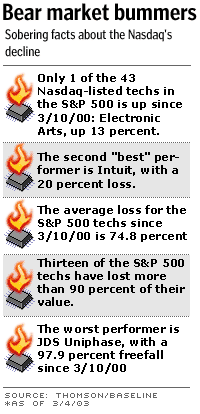NEW YORK (CNN/Money) � The Four Horsemen of the Nasdaq.
Remember them? Back in the mid-to-late 1990s, investors referred to Cisco, Dell, Intel and Microsoft as the so-called Four Horsemen because of their unquestioned market dominance.
But during the height of Internet mania, even they began to look stodgy ("Forget the PC -- the Web is the future!").
| More about technology
|

|
|
|
|
So tech enthusiasts gave the honors to Oracle (ORCL: Research, Estimates), Sun Microsystems (SUNW: Research, Estimates) (it put the dot in dot.com if you'll recall) and EMC (EMC: Research, Estimates) (even though it trades on the New York Stock Exchange). Cisco, being a networking company, was thought to "get" the Internet, however. They were the "New Horsemen of the Internet." JDS Uniphase (JDSU: Research, Estimates) was also sometimes mentioned as a member of the clan.
Oh, what folly. Now, as we near the three-year anniversary of the Nasdaq's all-time high, it is painfully obvious that today's Four Horsemen are, to quote the Talking Heads, same as it ever was.
The Horsemen are stronger
Shares of Sun and JDS Uniphase have plunged more than 90 percent since March 10, 2000 -- the day the Nasdaq closed at 5,048.62 -- while EMC has fallen 89 percent. What's more, all three companies reported losses in their latest fiscal year and each now faces intense competition in its respective businesses. It seems safe to say their glory days have passed them by.

Oracle's stock is only down 71.5 percent in the past three years. But it faces tough competition in the application software market, selling software to big business. The company has reported seven consecutive quarters of year-over-year sales declines.
Sure, the shares of Microsoft, Cisco, Dell and Intel have all taken a beating as well: Cisco (CSCO: Research, Estimates) is down 80 percent since March 10, 2000; Intel (INTC: Research, Estimates) is down 72 percent; Microsoft is off 54 percent; and Dell is down 49 percent.
But there's no denying that they are still the four most important companies in tech.
The four are the largest techs (by market value) on the Nasdaq. They all remained profitable during the tech depression and are expected to post double-digit percentage earnings increases in this fiscal year. All four have more cash now than they did three years ago, and two of them, Intel and Microsoft, even pay dividends. And each, despite some competitive threats, have kept a head up on the competition.
Microsoft (MSFT: Research, Estimates), despite its lengthy antitrust trial, still has the dominant share of the operating system market and has so far fended off threats from Linux. Intel's main rival, AMD (AMD: Research, Estimates), continues to bleed red ink.
Cisco continues to have a large market share lead on Juniper Networks (JNPR: Research, Estimates) and is expanding into areas such as storage and security. And Dell? It just reported its best quarter ever in terms of revenues. Hewlett-Packard (HPQ: Research, Estimates) on the other hand is struggling to find sales growth.
"These four are definitely in a much stronger competitive position than they were before the bubble popped," said Adam Adelman, a technology analyst with money management firm Philippe Investment Management. Adelman said his firm owns small amounts of all four stocks but that he wouldn't be buying more now due to concerns about valuations.
Valuations less frothy but not cheap
Ah yes, valuations. The Four Horsemen are all trading at more reasonable prices than they were three years ago. But just because the P/E ratios are lower does not mean that the stocks are necessarily cheap.

"There is a big difference between having a strong competitive position and attractive valuation," said Adelman.
As the chart to the right shows, estimated long-term growth rates are substantially lower now than three years ago. So the stocks are less expensive, but for good reason.
Matt Kelmon, president of Kelmoore Investment Co., also owns all four companies in his three funds: Kelmoore Strategy, Kelmoore Strategy Eagle and Kelmoore Strategy Liberty. Kelmon said he would buy Cisco on any more pullbacks and that Microsoft and Dell should remain top holdings unless there was a major change in the fundamentals.
But he is not as sanguine on Intel at its current valuation. The semiconductor business tends to have huge booms and busts, and Intel's valuation isn't as low as it has been during other trough periods.
"I remember in the early 1990s when Intel traded at 10 times earnings, and people thought that was expensive," Kelmon says. That probably won't happen today since Intel's stock would need to fall 64 percent from current levels (assuming that earnings estimates did not change).
Still, it's hard to bet against any of these four over the long haul. If nothing else, the brutal tech bear market reminded investors that the sector is cyclical. So once IT spending does improve, strong market leaders that survived the shakeout should capitalize.
"The longer the downturn in IT spending, the better it is for these companies in the long run," says Kelmon. "They will continue to gain market share as more companies go out of business."

|

